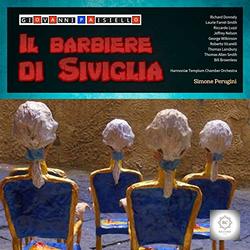| All Artists: Simone Perugini, Harmoniae Templum Chamber Orchestra, Richard Donnely, Laurie Lambert-Lane Title: Paisiello: Il barbiere di Siviglia Members Wishing: 0 Total Copies: 0 Label: RCL Release Date: 5/15/2019 Genre: Opera & Classical Vocal Style: Number of Discs: 2 SwapaCD Credits: 2 UPC: 191092247487 |
Search - Simone Perugini, Harmoniae Templum Chamber Orchestra, Richard Donnely :: Paisiello: Il barbiere di Siviglia
 | Simone Perugini, Harmoniae Templum Chamber Orchestra, Richard Donnely Paisiello: Il barbiere di Siviglia Genre: Opera & Classical Vocal Giovanni Paisiello (1740-1816) IL BARBIERE DI SIVIGLIA. Dramma giocoso in quattro atti su libretto di anonimo. Musica di Giovanni Paisiello. [A Comic Italian Opera in four acts by an anonymous Libretto. Music by Giovanni P... more » |
Larger Image |
CD Details
Synopsis
Product Description
Giovanni Paisiello (1740-1816) IL BARBIERE DI SIVIGLIA. Dramma giocoso in quattro atti su libretto di anonimo. Musica di Giovanni Paisiello. [A Comic Italian Opera in four acts by an anonymous Libretto. Music by Giovanni Paisiello]. NOTES: Il barbiere di Siviglia, ovvero La precauzione inutile (The Barber of Seville, or The Useless Precaution) is a comic opera by Giovanni Paisiello from a libretto by an anonymous, even though his name is not identified on the score's title page. The opera was first performed on 26 September 1782 (old Russian calendar, 15 September) at the mperial Court, Saint Petersburg. It was adapted from the play Le Barbier de Séville of Pierre Beaumarchais. The full title for the opera reads: "Il barbiere di Siviglia, ovvero La Precauzione inutile, dramma giocoso per musica tradotto liberamente dal francese, da rappresentarsi nel Teatro Imperiale del corte, l'anno 1782" (Trans: "The Barber of Seville, or The Useless Precaution, comical drama with music freely translated from the French, presented at the Imperial Court Theater, the year 1782"). The story essentially follows the original Beaumarchais play, and in some places directly translates songs and dialogue. The plots of the Paisiello and the Rossini versions very closely resemble each other, with subtle differences. The anonymous author of the text puts a greater emphasis on the love story and less on the comic qualities.
